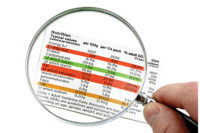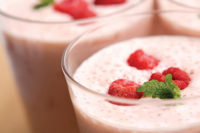As a registered dietitian for 23 years, busting nutrition myths is both a calling and a passion. But since some nutrition myths are rampant and refuse to die, myth-busting can be a pursuit in provocation. One such myth is that whole milk is the only type of milk that contains vitamin D.
Unfortunately, dairy processors are partly responsible for this myth’s perpetuation. Whole milk is often labeled — very prominently — as “Vitamin D Milk.” On the labels of other types of milk, the statement that vitamin A and D have been added is in fine print. Who can blame consumers for assuming reduced-fat, low-fat, and fat-free milk are void of vitamin D?
Another myth: Skim milk is not only skimmed of fat, but also of vitamins and minerals. White water, anyone? The fact is the dairy industry knows that milk’s got it going on, but most consumers don’t. Why not put it out there? Put it on the label, loud and proud: “9 Essential Nutrients including Vitamin D!”
That’s nine essential nutrients including three of the four nutrients that are low enough in the diets of Americans to be a public health concern: potassium, calcium and vitamin D. “Nowadays, people are looking to get as many nutrients as possible out of the calories they consume,” says Greg Miller, PhD, president of the Dairy Research Institute and executive vice president of the National Dairy Council. “Dairy provides nine essential nutrients — plus zinc.” A recent review of consumption data indicates that dairy foods also are an important source of dietary zinc, explains Miller. “Consuming dairy is a great way to get nutrients and enhance overall diet quality.”
And that’s nine essential nutrients (plus zinc) in one package: A nutritional bargain. Milk and milk products offer several key nutrients at a very affordable price. According to a cost analysis by Drewnowski published in the October 2011 issue of the Journal of the American College of Nutrition, milk and milk products were by far the lowest-cost sources of dietary calcium and were among the lowest-cost sources of riboflavin and vitamin B-12. The nutrient/cost comparison of milk and other beverages is a mainstay of MilkPEP’s multi-year milk promotion campaign, The Breakfast Project, which utilizes the milk-gives-you-more-for-your-money infographics, “Making Cents of Breakfast Beverages” and “See How Your Milk Stacks Up.” Bravo!
Milk
Milk’s got it, so let’s flaunt it
Milk has 9 essential nutrients, but not everyone knows




